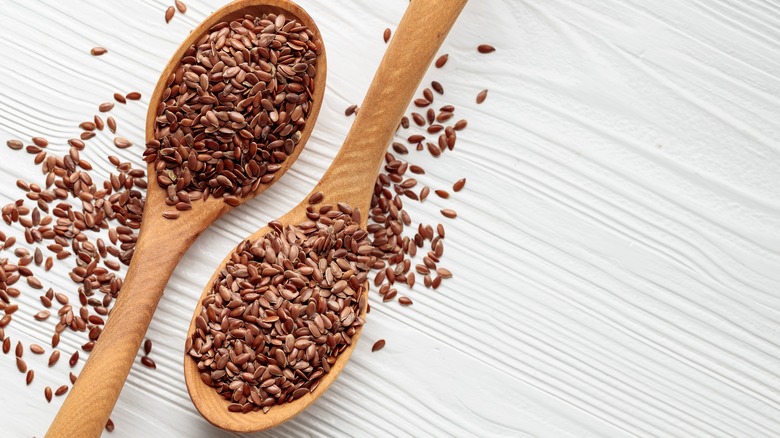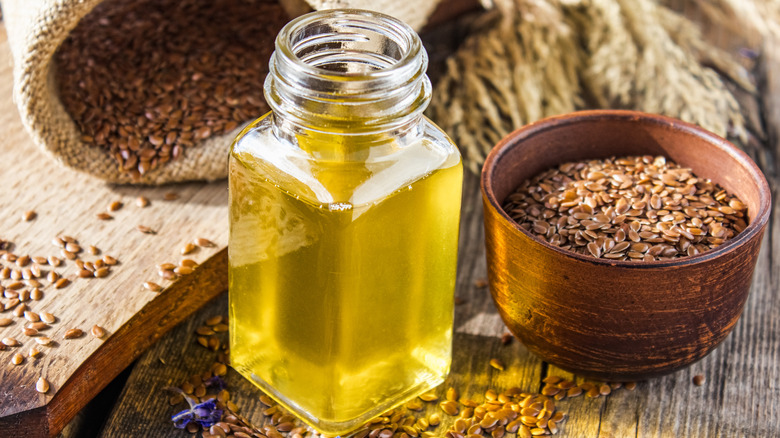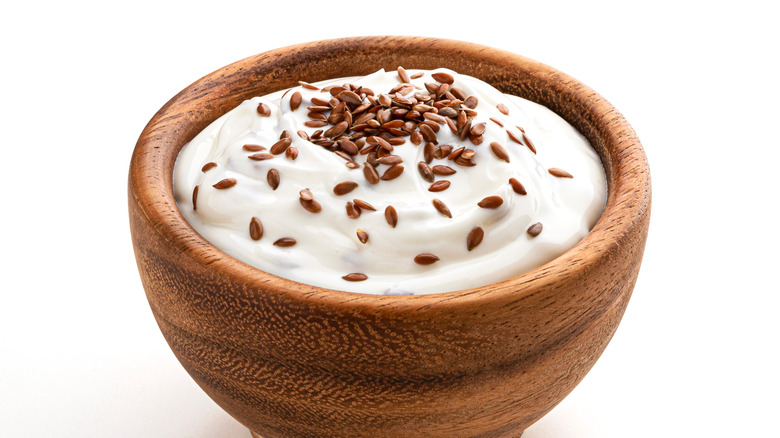Why Flaxseeds Could Be Key To Aging Well
Those tiny little seeds you see sprinkled on crackers and muffins seem insignificant, but flaxseed packs serious nutritional power. According to Healthline, a tablespoon of flaxseeds has 55 calories and 2.8 grams of fiber. Up to 80% of that fiber is insoluble fiber, which means that it helps keep you regular. Flaxseeds also have soluble fiber that keeps your cholesterol and blood sugar levels in check while keeping your gut healthy. They have 4.3 grams of fat per tablespoon, and most of that fat comes from omega-6 and omega-3 fatty acids. Flaxseeds are rich in alpha-linolenic acid (ALA), which is an essential omega-3 (via Healthline).
A 2014 article in the Journal of Food Science and Technology called flaxseed not only a "functional food" but also "medicine." That's because flaxseed has been linked with reductions in cardiovascular disease, arthritis, and osteoporosis, just to name a few. In fact, there are many ways in which flaxseeds can benefit health, specifically in regards to helping you as you age.
How flaxseeds help with aging
The fiber in flaxseeds can be especially beneficial as we age. According to a 2015 meta-analysis in American Journal of Epidemiology, each 10-gram increase in fiber intake was associated with a 10% reduction in the risk of death. A 2015 review in the Journal of Food Science and Technology said that the fiber in flaxseed can protect against cardiovascular disease by lowering cholesterol and blood glucose. High cholesterol levels and blood sugar can influence the likelihood of Alzheimer's Disease, according to the National Institute on Aging.
Lignans play a role in our digestive health, and you'll find plenty of them in flaxseed (via Oregon State University). Lignans also help lower blood pressure, and some evidence has linked lignans with a lowered risk of hormone-related cancers such as breast cancer. Because many diseases are often linked with chronic inflammation, diets rich in lignans have been linked to reduced levels of chronic inflammation (per a 2014 study in Cancer Causes & Control). Regulating inflammation can also intervene in the aging process, according to a 2020 article in The FEBS Journal.
The alpha-linolenic acid (ALA) in flaxseed can also ward off inflammation and conditions such as heart disease, asthma, and high blood pressure, according to Mount Sinai. A 2015 study in BioMed Research International suggested that ALA might protect the brain against neurological disorders. Aging adults are more susceptible to neurological disorders such as strokes, Alzheimer's disease, and Parkinson's disease (per Reliant Medical Group).
How to get more flaxseed in your diet
If you want to add more healthy flaxseed to your diet, your digestive system might not like the whole flaxseed. Besides, the seeds themselves might pass through your system without extracting the nutrients (via Mayo Clinic). Therefore, it's best to buy flaxseeds whole and then grind them at home in a coffee grinder to make them easier to digest. You can buy them already ground at the store, but they won't last as long, according to Cleveland Clinic. Flax oil has an even shorter shelf life, and it lacks fiber. Be sure to check any expiration date because flaxseed can smell rancid after a while.
You can add ground flaxseed to breakfast cereals or yogurt, or mix them with a condiment when making a sandwich (per Mayo Clinic). To make your baking a little healthier, add a little ground flaxseed to replace some of the flour (via WebMD).
If your diet isn't already rich in fiber, adding too much flaxseed could cause digestive issues such as bloating. Therefore, start with a little flax at a time until your system adjusts (via Healthline).



